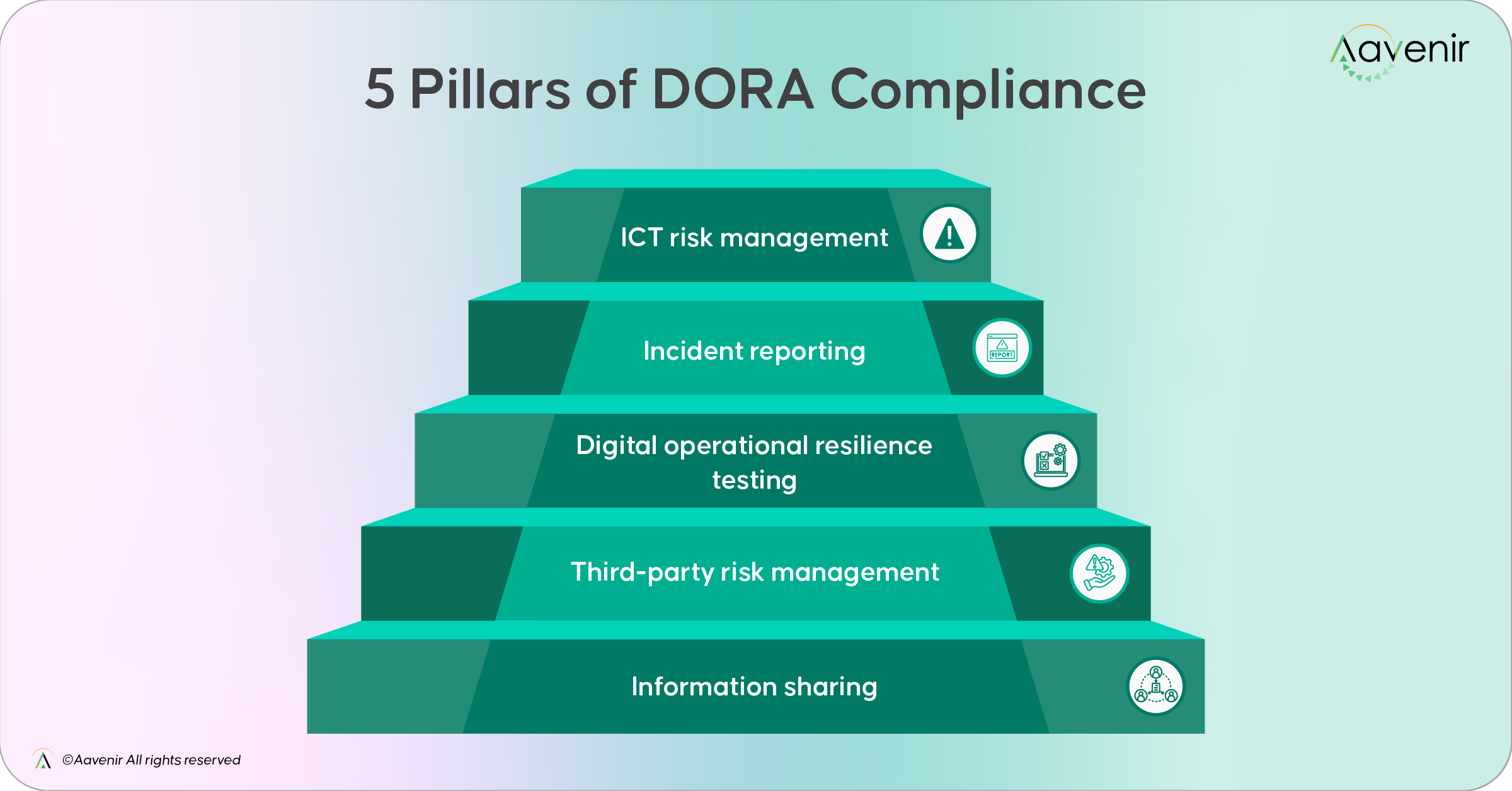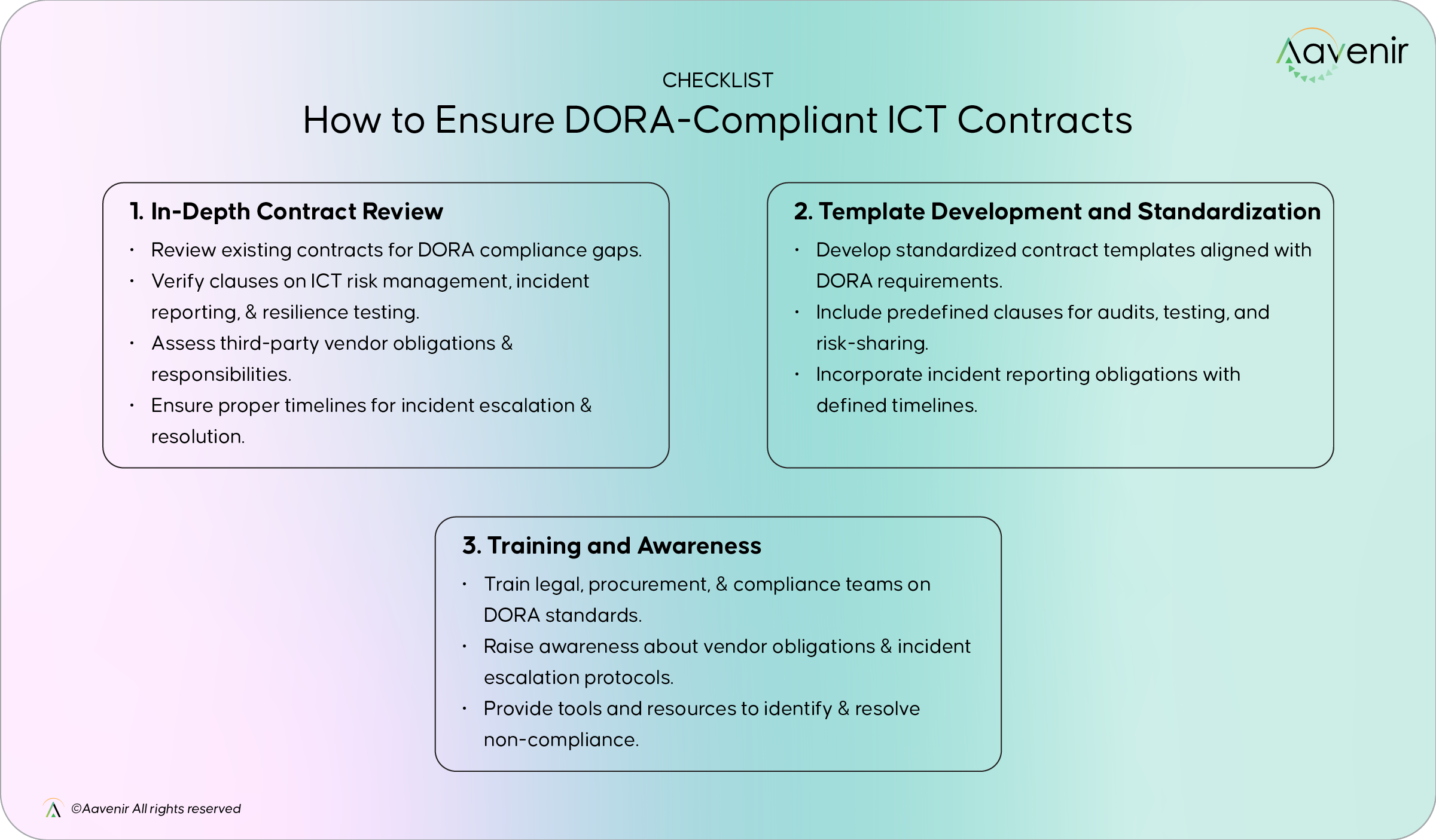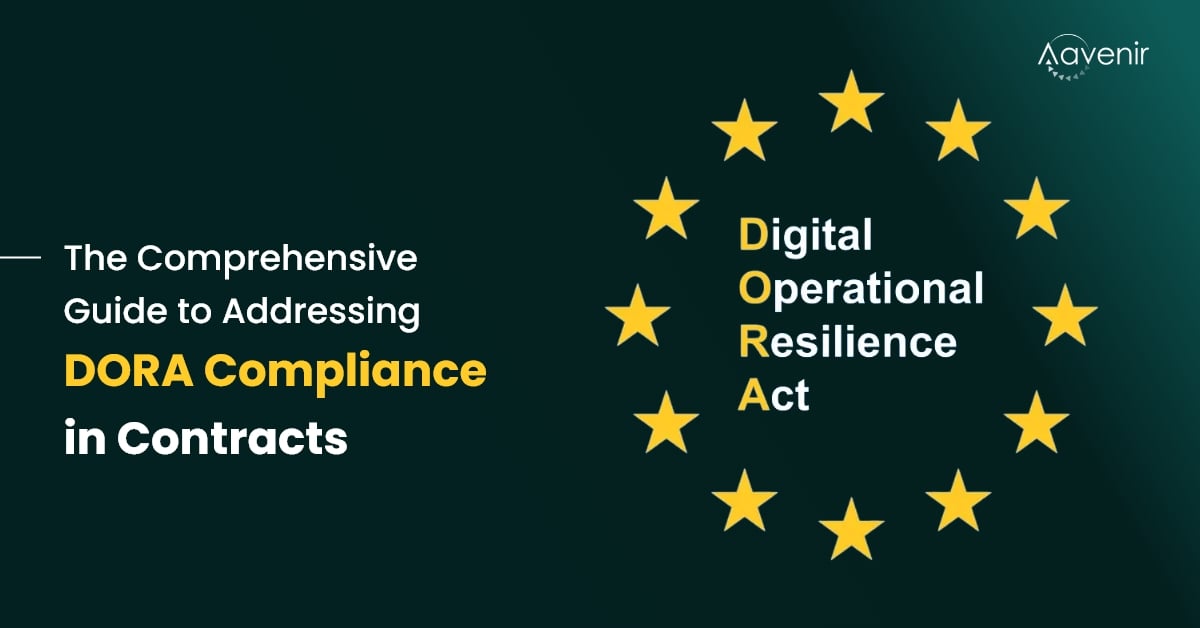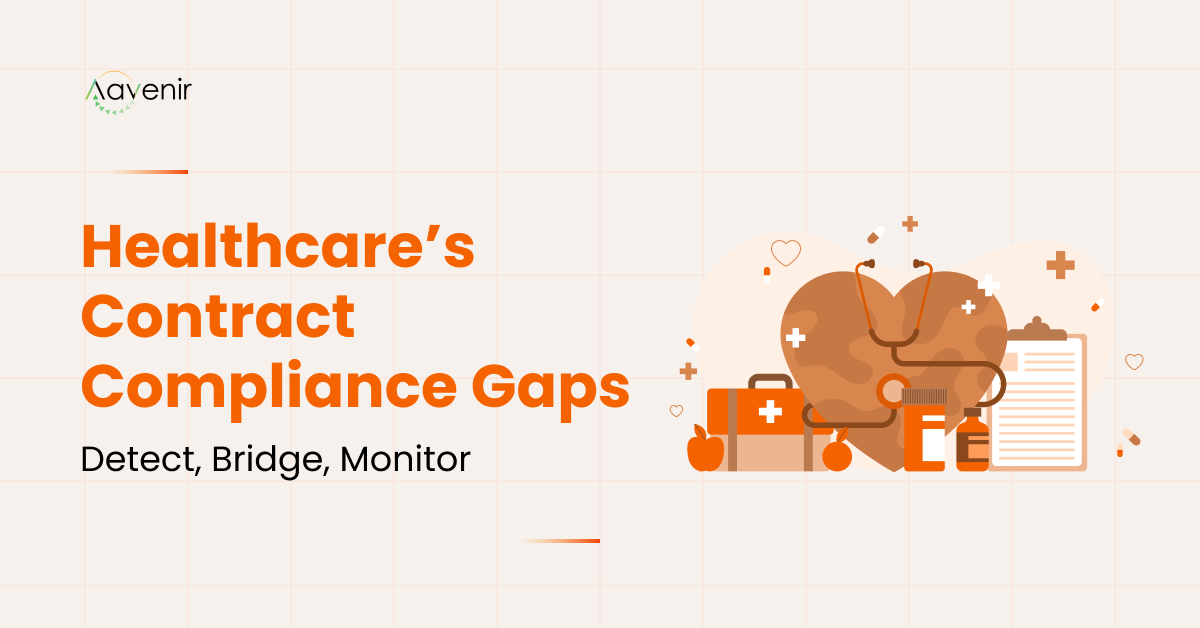The Digital Operational Resilience Act (DORA) instructs financial entities and third-party Information and Communication Technology (ICT) service providers to employ certain guidelines that protect their stakeholders’ data.
DORA ensures these large organizations and enterprises have robust IT and operational resilience.
Non-compliance can expose sensitive information to hackers and lead to legal penalties and reputational damage. Therefore, companies must craft DORA-compliant contracts to mitigate risks, enhance operational stability, and comply with the regulations.
In this article, let’s look at how teams can align their contracts with the DORA framework.
What is DORA Compliance?
DORA compliance refers to adherence to the European Union’s (EU) Digital Operational Resilience Act (DORA). The act enhances IT security and operational resilience for financial entities and ICT service providers and requires them to achieve full compliance by January 17, 2025.
This regulation ensures organizations can effectively withstand, respond to, and recover from ICT disruptions, safeguarding critical operations. Even though DORA compliance is primarily applicable to the EU region, organizations operating across jurisdictions must ensure that their supply chains and ICT service providers comply with DORA. This will not only help avoid disruptions and maintain market access in the EU, but also set a precedent for global operational resilience standards.
DORA compliance comprises five core pillars: ICT risk management, incident reporting, digital operational resilience testing, third-party risk management, and information sharing.
The scope of DORA compliance applies to financial institutions such as banks, insurance companies, investment firms, and ICT service providers like cloud platforms, software vendors, and managed service providers.
Ensuring a DORA Compliant Supply Chain
Ensuring DORA on a supply chain level enhances operational resilience, reduces risks, and establishes regulatory alignment across all partners. Teams can do that by:
1. Identifying ICT Services and Providers
The first step is to recognize the relevant ICT services and assess their impact on operations. This enables organizations to evaluate the extent to which the third-party vendor providing the services is essential.
Next, the vendors will be considered based on criteria such as security protocols, incident response capabilities, and governance standards to ensure compliance with DORA.
2. DORA Contractual Compliance Management
Draft a contract that include clauses for ICT risk management frameworks, incident reporting obligations, and resilience testing requirements. Continuous monitoring can be done through periodic audits, performance assessments, and risk analysis.
Aavenir simplifies this through AI-powered contract lifecycle management. It makes drafting, reviewing, and monitoring vendor contracts efficient while maintaining DORA compliance.
Steps to Manage DORA Compliance in Contracts
Teams can ensure DORA compliance in their contracts in five easy steps:
1. Understand the 5 Pillars of DORA
Grasping the 5 core pillars of the framework is crucial for ensuring it during contract management:

- ICT Risk Management and Governance: Implement frameworks to identify, manage, and mitigate IT risks effectively.
- Digital Operational Resilience Testing: Regularly test systems to detect vulnerabilities and ensure resilience.
- Incident Reporting: Establish protocols for timely reporting of ICT-related incidents to regulatory authorities.
- Third-Party Risk Management: Manage risks associated with external ICT service providers to ensure compliance.
- Information Sharing: Facilitate threat intelligence sharing to strengthen collective resilience within the financial ecosystem.
2. Review and Resolve Gaps in ICT Contracts
Companies should thoroughly audit their new and existing financial and ICT vendors for DORA contractual compliance by identifying gaps in obligations, risks, and incident response processes that may indicate DORA violations.
Look for clauses related to resilience testing, incident reporting, and third-party governance requirements.
Doing this manually can be daunting, considering it requires keen attention to detail. Teams can leverage Aavenir to automate contract analytics. The software automatically identifies gaps, missing clauses, and recommends DORA compliant terms and clause related to the type of contract.
3. Add DORA-Compliant Clauses in New and Renewed Contracts
Whenever drafting new or renewing existing contracts that currently incompletely comply with DORA guidelines, make it a point to add compliant clauses. At the same time, the clauses should be inserted by default into all the new contracts.
The legal and compliance teams must validate risk-sharing clauses in cyber incidents, incident reporting timelines, and mandatory resilience testing.
Aavenir helps organizations insert DORA-compliant clauses into contracts quickly and accurately using legal-approved DORA compliant contract templates. The AI-powered solution analyzes contracts and recommends clauses from the pre-approved library of DORA compliance terms & clauses, making the overall process efficient.
4. DORA Compliant Vendor Onboarding and Monitoring
Prepare a robust RFP, RFQ, or RFI for financial and ICT vendor selection, ensuring alignment with the company’s DORA compliance requirements. Teams can build a tagging system to classify vendors as compliant or non-compliant based on their adherence to DORA standards.
Sourcing and RFx Management solutions like Aavenir Onboardingflow foster collaboration between legal and business departments and simplify DORA-compliant vendor selection by preparing robust RFx questions that effectively validate vendors against DORA compliance requirements. The solution streamlines the evaluation process and automates compliance tracking, helping enterprises and businesses make a safe choice quickly.
5. Integrate GRC (Governance, Risk, and Compliance) Systems
Enterprise GRC or third-party risk management (TRPM) systems provide real-time visibility into the compliance needs of a company. When integrated with the contract management solution, they can automate risk assessments, incident reporting, and regulatory tracking to meet DORA obligations efficiently.
Source-to-Pay Solutions such as Aavenir RFPflow, Aavenir Contractflow, and Aavenir Obligationflow seamlessly integrates with GRC platforms like ServiceNow. This enables organizations to monitor vendor compliance and DORA-specific obligations across their source-to-pay lifecycle.
Checklist to Ensure DORA-Compliant ICT Contracts

1. In-Depth Contract Review
- Review new and existing contracts for DORA compliance gaps. Use AI to enhance speed and accuracy in contract review.
- Verify clauses on ICT risk management, incident reporting, and resilience testing.
- Assess third-party vendor obligations and responsibilities.
- Ensure proper timelines for incident escalation and resolution.
2. Template Development and Standardization
- Develop standardized contract templates aligned with DORA requirements.
- Include predefined clauses for audits, testing, and risk-sharing.
- Incorporate incident reporting obligations with defined timelines.
3. Training and Awareness
- Train legal, procurement, and compliance teams on DORA standards.
- Raise awareness about vendor obligations and incident escalation protocols.
- Provide tools and resources to identify and resolve non-compliance.
The Goal: Achieving DORA Contractual Compliance
Financial institutions and ICT service providers must comply with DORA guidelines to maintain operational resilience, mitigate risks, and meet regulatory obligations. Non-compliance can lead to security breaches, legal penalties, operational disruptions, and reputational damage.
Organizations can achieve DORA-compliant ICT contracts by:
- Conducting comprehensive contract audits to identify and resolve gaps
- Standardizing templates with clear DORA-approved clauses
- Monitoring third-party compliance
- Aligning processes with DORA’s five pillars
Aavenir streamlines DORA compliance through AI-powered contract management, vendor onboarding, and GRC integrations. It automates contract reviews, clause standardization, and risk tracing.
How Aavenir Supports DORA Contractual Compliance
The Aavenir solution supports DORA compliance requirements through a variety of capabilities. In addition, the configuration flexibility can address any specific DORA requirements you may need.
The following are some of the key capabilities Aavenir has that address DORA compliance:
- Setup DORA compliant clauses
- Identify deviations against DORA-compliant clauses as clauses get edited during negotiation.
- Identify contracts containing DORA-specific clauses, or the absence of clauses.
- Tag and identify ICT services vendors.
- Identify DORA-specific obligations from contracts using AI and track compliance with them.
- Integrate with a GRC/TPRM solution (e.g. ServiceNow GRC/TPRM) to ensure alignment with your overall vendor risk management strategy.
Want to explore how Aavenir makes it easy to ensure DORA Compliance in Contracts?
Contact us today for a free personalized demo.
Frequently Asked Questions
1. What are the 5 pillars of DORA regulation?
The 5 pillars of DORA regulation are ICT risk management, incident reporting, digital operational resilience testing, third-party risk management, and information sharing. These pillars ensure financial entities and ICT service providers proactively manage risks, swiftly respond to incidents, and maintain operational continuity and resilience against ICT disruptions.
2. What are the main requirements of DORA?
DORA’s requirements include ICT risk management, incident reporting, resilience testing, third-party risk management, and information sharing. These pillars ensure organizations can effectively withstand, respond to, and recover from ICT disruptions.
3. Who needs to comply with DORA regulations?
Financial institutions such as banks, insurance companies, investment firms, and ICT third-party providers (e.g., cloud vendors) must comply with DORA regulations to ensure operational resilience.
4. How can AI tools like Aavenir help with DORA compliance?
Aavenir automates contract reviews, identifies compliance gaps, and tracks obligations. Its AI-powered solutions streamline vendor onboarding, clause management, and reporting to ensure DORA compliance across ICT contracts and third-party relationships.
5. How can organizations identify and map their ICT services for DORA compliance?
Organizations can map ICT services by classifying them based on criticality, assessing risks, and identifying third-party dependencies. This process ensures a clear understanding of ICT systems aligned with DORA requirements.





